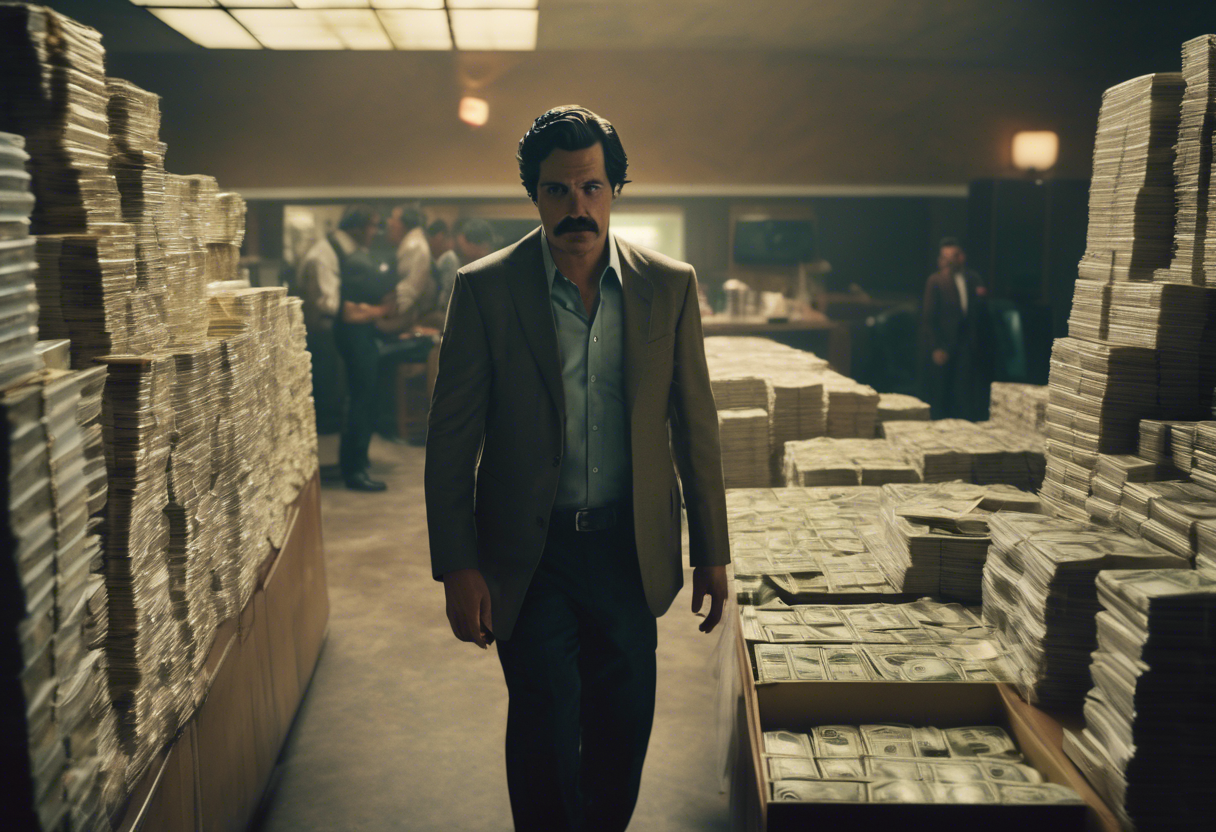Contents
Narcos Season 3: Episode 3 – Follow the Money
Introduction
"Narcos" is a critically acclaimed Netflix series that delves into the world of international drug trafficking, particularly focusing on the rise and fall of prominent cartels in Colombia and Mexico. Created by Chris Brancato, Carlo Bernard, and Doug Miro, the series is known for its meticulous research, gripping storytelling, and strong performances. Season 3, which premiered in 2017, shifts its focus from the Medellín cartel to the Cali cartel, exploring the intricate web of drug trafficking and law enforcement efforts.
"Follow the Money," the third episode of Season 3, is directed by Gabriel Ripstein and written by David Matthews. This episode is significant as it continues to unravel the complexities of the Cali cartel’s operations and the relentless pursuit by law enforcement agencies. The episode’s title, "Follow the Money," underscores the central theme of financial transactions and the challenges of tracing and disrupting the cartel’s financial networks.
Plot Summary
The episode "Follow the Money" opens with a narrative that intertwines several key storylines, each contributing to the broader tapestry of the Cali cartel’s struggles and the DEA’s relentless pursuit. The Rodríguez brothers, Gilberto and Miguel, are in hiding during negotiations with the authorities, a strategic move to protect themselves as they attempt to negotiate a deal that would allow them to avoid severe penalties.
Meanwhile, Pacho Herrera, a high-ranking member of the Cali cartel, travels to Mexico to meet with Amado Carrillo Fuentes, known as the "Lord of the Skies." This meeting is pivotal as it highlights the expanding reach of the Cali cartel and their efforts to forge alliances with other powerful drug lords. Pacho’s mission is to secure a partnership that would facilitate the transportation of cocaine from Colombia to the United States via Mexico, a route that promises higher profits and reduced risks.
In Cali, Javier Peña’s new DEA team, which includes agents like Chris Feistl and Daniel Van Ness, arrives with a renewed focus on dismantling the Cali cartel. Their strategy involves targeting the financial backbone of the cartel, understanding that disrupting the money flow is crucial to bringing down the entire operation. The team’s visit to Cali marks the beginning of a intense cat-and-mouse game between the DEA and the cartel.
As the Rodríguez brothers navigate their negotiations, they face internal conflicts and external pressures. Gilberto, the more cautious of the two, is keen on securing a deal that would allow them to retire from the drug trade with minimal consequences. However, Miguel is more skeptical, fearing that any deal with the authorities could be a trap. This tension between the brothers reflects the broader dilemma faced by many in the cartel: the desire to escape the dangerous world of drug trafficking versus the fear of betrayal and the consequences of surrender.
The DEA’s efforts to follow the money lead them to various financial institutions and money launderers associated with the cartel. They uncover a complex network of shell companies, offshore accounts, and cash smuggling operations. This financial trail is fraught with challenges, as the cartel has sophisticated mechanisms to hide and move their money undetected.
In another significant development, the character of Alan Starkman, a lawyer based on the real-life figure Joel Rosenthal, is introduced. Starkman’s role in the episode highlights the legal and ethical ambiguities faced by those who work with or for the cartel. His character serves as a reminder that the world of drug trafficking is not just about violence and crime but also about the intricate legal and financial structures that support it.
Throughout the episode, the narrative also delves into the personal lives of the characters, particularly the DEA agents. Javier Peña’s narration provides a reflective tone, emphasizing the universal pursuit of money and the different ways it shapes the lives of both the good guys and the bad guys. This theme is reinforced by the contrast between the luxurious lifestyles of the cartel members and the mundane, often bureaucratic, lives of the DEA agents.
The episode culminates with several key events that set the stage for the rest of the season. The Rodríguez brothers’ negotiations reach a critical point, Pacho’s alliance with the Lord of the Skies begins to bear fruit, and the DEA’s financial investigation starts to yield results. These developments underscore the escalating stakes and the increasing complexity of the conflict between the Cali cartel and law enforcement.
Themes and Symbolism
"Follow the Money" explores several themes that are central to the broader narrative of "Narcos." One of the most prominent themes is the power of money and its ability to shape lives and drive actions. The episode illustrates how money is both a motivator and a corrupting influence, affecting characters on both sides of the law.
Another significant theme is the concept of loyalty and betrayal. The internal conflicts within the Cali cartel, particularly between the Rodríguez brothers, highlight the tensions that arise when loyalty is tested by the prospect of personal gain or survival. This theme is also reflected in the DEA’s efforts, where agents must navigate their own moral boundaries in the pursuit of justice.
The episode also delves into the symbolism of power and control. The meeting between Pacho and the Lord of the Skies symbolizes the cartel’s quest for dominance and expansion. The DEA’s focus on disrupting the financial networks of the cartel represents their attempt to strip the cartel of its power and control.
Cultural Impact
"Follow the Money" was well-received by audiences and contributed to the overall popularity of "Narcos" Season 3. The episode’s intricate plot and character developments resonated with viewers who were invested in the series. The show’s portrayal of real-life events and figures also sparked significant interest and discussion about the history of drug trafficking and law enforcement efforts.
The episode’s influence on pop culture is evident in its references in other media. The show’s depiction of the Cali cartel and its operations has been cited in various documentaries and news articles, highlighting its impact on public discourse about drug trafficking.
Critical Reception
Critics praised "Follow the Money" for its engaging narrative and strong performances. The episode was lauded for its ability to balance multiple storylines while maintaining a cohesive and compelling narrative. The direction by Gabriel Ripstein and the writing by David Matthews were particularly praised for their ability to keep the audience engaged.
Viewers also responded positively, appreciating the episode’s detailed portrayal of the financial aspects of drug trafficking and the DEA’s efforts to combat it. The episode’s ratings were high, reflecting the overall satisfaction of the audience with the direction of the season.
Legacy
"Follow the Money" has left a lasting impact on the "Narcos" series and beyond. The episode’s focus on the financial aspects of drug trafficking has influenced how subsequent episodes and other shows approach this topic. The character developments and plot twists introduced in this episode have also contributed to the overall arc of the season, making it a pivotal installment in the series.
The episode’s continued relevance is evident in its influence on future media and creators. The detailed portrayal of real-life events and the complexities of drug trafficking have set a high standard for crime dramas, encouraging more nuanced and accurate depictions of these issues.







